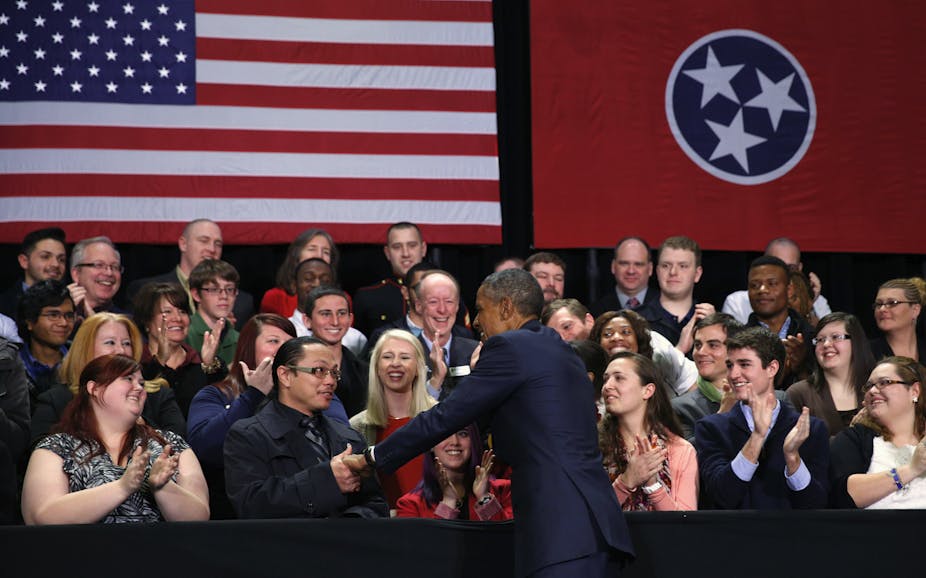Demonstrating again he is no lame-duck president, Barack Obama has proposed a new higher education initiative celebrated on social media as #FreeCommunityCollege.
Obama’s plan to provide free community college in the US appears as bold and divisive as his health care programme, popularly known as Obamacare. But the details of “America’s College Promise” will determine both the reality behind the promises and just how tarnished Obama’s education legacy will be.
Publicly funded, not free
As in Germany, where university tuition fees have been phased out in all states, Obama’s community college proposal has been universally promoted in the US as “free” – revealing the political necessity for downplaying full funding of public institutions.
The roots of Obama’s proposal appear to be work by economists Claudia Goldin and Lawrence Katz and programmes in Chicago and Tennessee, where Obama made the formal announcement. Since Tennessee’s plan was developed under a Republican governor, Obama’s federal plan may have the same bi-partisan appeal of No Child Left Behind (NCLB) – the federal accountability legislation for children between kindergarten and grade 12 (K-12).
But political appeal has not fallen in line with educational appeal in recent years. Teachers have often resisted Obama’s education programmes, policies that continue commitments to accountability, standards, and high-stakes testing which began under George W Bush.
The devil in the details for this promise of fee-free community college includes similar problems related to Obamacare: how to fund it, who benefits and the level of state buy-in for funding and implementing community college reforms.
If the Obama plan remains close to the Tennessee plan, for example, low-income students already receiving Pell Grants – federal, needs-assisted grants for college – will see little new assistance. Access to the programme will remain bound to whether individual states choose to participate in both co-funding and commitments to higher education.
Legacy issues
Democrats and social media have been quick to praise Obama and his plan, which will be put before Congress this session. There it is likely to face fierce opposition. But ultimately, the Obama educational agenda may already be beyond repair.
Obama’s education legacy rests on an unpopular secretary of education, Arne Duncan, and a long list of equally unpopular programmes among teachers, such as the Race to the Top innovation drive and a waiver on some of the provisions of NCLB. A raft of commitments have also been unpopular among advocates, including accountability reform built around the Common Core, new methods for evaluating teachers and the expansion of support for Teach for America and charter schools.
Educators and researchers have been quick to highlight that accountability has failed to achieve touted political goals and that the research base for most of the endorsed programmes is either incomplete or runs counter to policy.
Despite the appeal of so-called “free” community college, educators remain sceptical of Obama’s plan, calling into question not only the programme but also the larger impact of his education legacy.
Too little, too late?
If fee-free community college is really to become a “game-changer” there are some key things the policy must accomplish.
Since federal initiatives and funding have often been used under Obama to leverage discredited policies and programmes in K-12, many are concerned that the free community college programme will also yield too much federal control over higher education.
College access and the complicated student debt debate for higher education are significant problems for poor and minority students in the US. This free community college proposal appears unlikely to address either of these issues, because the additions to Pell Grants are likely to be small and higher education involves many costs as well as tuition. The Obama administration also needs to address college access and affordability in order to support the populations of students most in need of social mobility and work equity.
Free community college is too little, too late in the context of the continued dismantling and underfunding of public school education in the US. Virtually all of the policies under Obama have failed to address the corrosive impact of social inequity on the ability of schools to be effective or of children to learn. Free community college will mean almost nothing if public education policy for school-aged children remains focused on accountability and not equity.
Any new Obama administration education policy is also destined to fail unless there is also adequate social and jobs policy addressing race and class equity.
The false promise of ‘free’
Without addressing the issues above, the promise of “free” community college will join Obama’s “hope and change” as mere political rhetoric, building a failed education legacy similar to that of George W Bush.
Community college degrees will be no good for young people when no relevant or stable jobs exist. And more disturbing is the reality about the consequences of higher education in the context of social class and race.
As political blogger Matt Bruenig has detailed, those born wealthy who don’t attend college have significant advantages over those born poor and completing college. Social mobility is extremely weak in the US, even when people complete college.
Research in a 2014 policy paper for the think-tank Young Invincibles showed that blacks with some college have the same employment potential as white high-school drop-outs. And while more education does equal greater income within race, as the graph below from Demos shows, educational attainment appears not to overcome significant inequity among races.

The best-case scenario may be that Obama’s community college proposal is the start of a conversation in the US about the value of fee-free higher education. But many remain sceptical. A failure to change course on public education policies for school children or to address race and class equity in society as well as the jobs market will prove that Obama’s education legacy retains the established status quo of failed bureaucratic reform.

